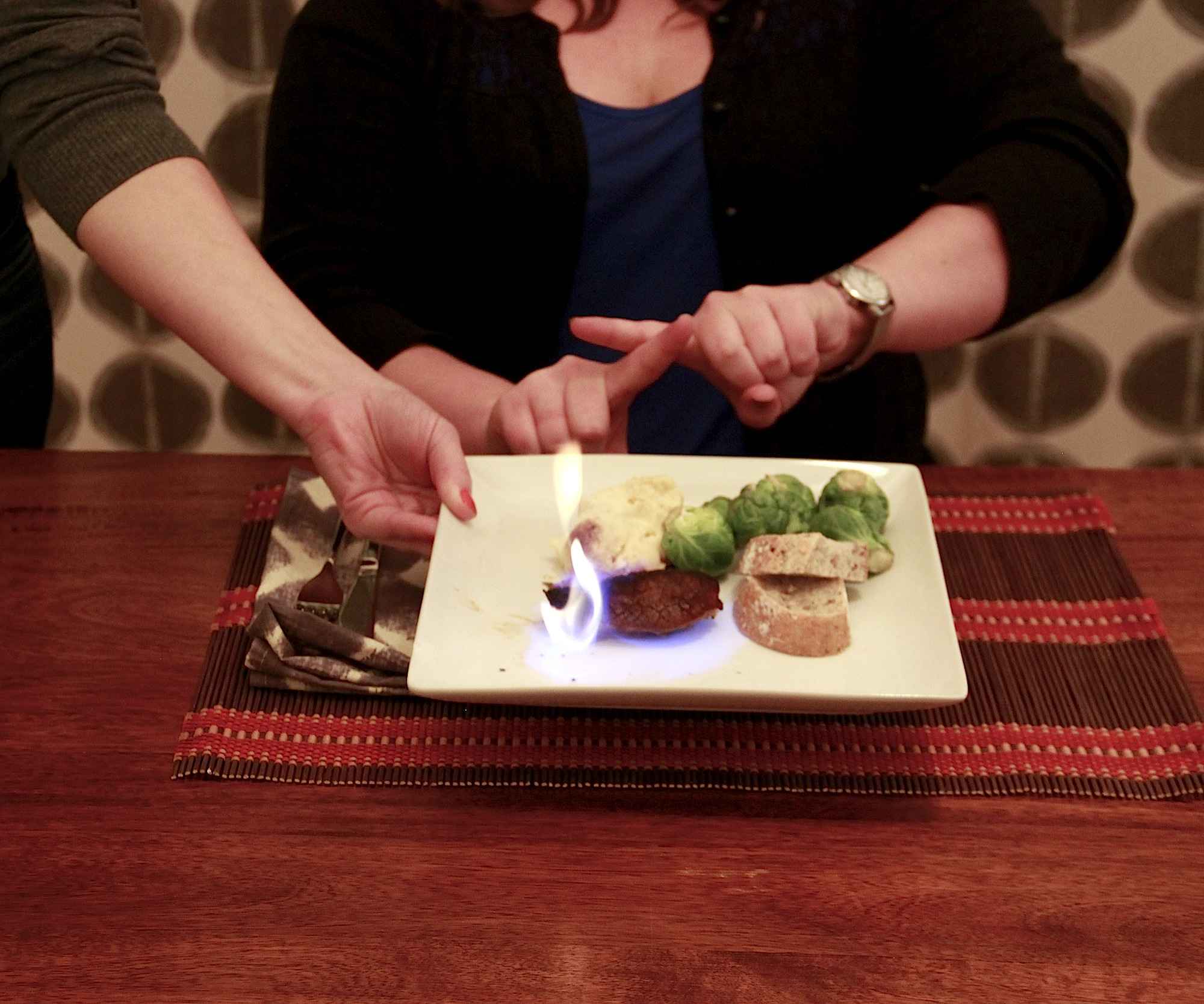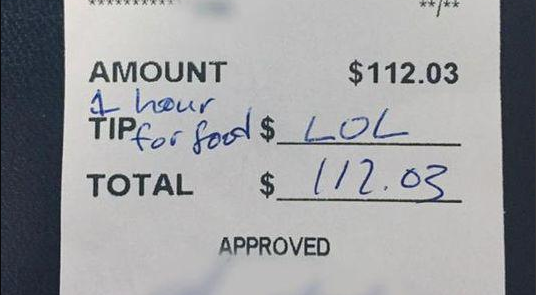
Ever wondered what your server at the restaurant says about you to the Chefs and other servers, once they have gone back into the kitchen? Having worked in the restaurant industry for about twenty years, I would like to share my observations, in an attempt to make the dining experience more enjoyable for both the guest, and the people working in the service industry. As it turns out, common sense is not very common. We should never assume that people know these things. It is better to state the obvious than to assume, thus making an ass of oneself and everybody else around us. Having said that, if you find yourself guilty of one of the trespasses listed before, fear not. I am not here to judge you, but only to enlighten you, because if you have never worked in the restaurant industry, you may not be aware of what goes on behind the scenes after you have made a scene. Enjoy the read, take it easy on yourself, and strive to do better next time you go out to eat.
Here are the ten sins some guests commit when they are dining at a restaurant.

- Intimidating the host into providing a table in an obviously busy restaurant.
- Now, you may be wondering, “do people actually do this?” Yes. Yes, they do. Usually men on a hot date are the culprits here, as they attempt to impress their date but forget to make a reservation. Upon arriving at the restaurant he may panic after realizing how packed the place is, and instead of admitting to having made a mistake and finding an alternative, or waiting like everyone else, he politely asks for a table, but escalates in temperament when the poor little hostess, usually a young, tiny lady, informs him that there are no tables available at the moment. The man results to yelling and using profanity. I witnessed this happen some years ago, and the poor little hostess was a nervous wreck after that. Not to mention that the man’s date was not impressed, judging by the mixed look of surprise and disgust on her face. The man’s antics did not earn him a table either. The manager was notified, and our culprit had to get in the back of the line, like everybody else. It was quite an entertaining scene for the rest of the guests waiting.

- Looking at your phone while your waitress is talking to you.
- This one may seem like another no-brainer. Unfortunately in this technology driven world, many of us make this mistake. I cannot count how many times in my restaurant career I approached a table as a waitress and was completely ignored by an entire family of cell phone zombies. After a minute or so of me awkwardly trying to get their attention, the one I presumed to be the mother, looks up and says, “oh, hey!”, I greet and begin reciting the specials, but meanwhile the one I presume to be the dad, is still on his phone, while little John and Jack try to loudly outspeak me by yelling their drink orders at me. Later on, when I come back to take the order, the dad will ask me about the specials, which he would have heard me describe earlier if he had been paying attention and hadn’t been on his phone. Nevertheless, I like getting a tip, so I calmly repeat the specials with a smile. Even now as I write this, I can feel my blood pressure rising.

- Talking to others at the table while server attempts to take the order.
- I just heard a loud “amen” from all the servers in my blogging congregation. I mean, seriously people? Do you really have to pretend that yours is the only table in the restaurant and therefore the server has nothing else to do but wait for you to complete your story about what it was like when you went to Timbuktu? How about taking a pause, allowing the server to finish taking the orders, and then commencing with your story? What people who have never been a server fail to notice, is the other tables giving your server ugly stares because they are wondering why they have not be served yet. So, please, be considerate, and release your server as soon as possible. Being a waiter is an easy job, but it can turn into hell when there are two or more unhappy tables on a busy night.

- Ordering items which are nowhere on the menu.
- Don’t get me wrong. We understand that there are people who are afflicted with allergies and celiac disease. Dietary constrictions are well understood and welcomed by most chefs. However, there are guests who like to just tweak the menu because they always want things their way. In the service industry we say that the customer is always right. This is not true by a long shot. Based on my experience. The customer is usually wrong, because they do not know the inner workings of the industry in question, but we let them be right, because we like their money. Some people take complete advantage of this. Bringing your child into a strictly fine dining restaurant that only serves steaks, fish and foie gras, and then insisting that the chef makes a burger and fries for him. This is just one example of many. Here is how it works behind the scenes. The chef orders groceries based on the menu. If they never serve burgers, there will be no hamburger meat on the premises. So, it’s not that the establishment does not want to please you, but that they cannot make your wish come true. Nobody who still works in the restaurant industry will ever admit what I am about to say to you, for fear of losing their job, but here it is. Ordering stuff that is not on the menu, really pisses the Chef off! And yes, everyone in the kitchen, will curse the day you were born.

- Sending mostly eaten food back.
- Sometimes the server may take a while to get back after serving your meal. This server needs more training. Usually, the server should come back in two minutes to confirm that your meal is okay. If your meal is not up to par, and your server takes more than two minutes to return, get the attention of another server, or the host. In a good restaurant, there should be a floor manager walking around touching tables anyways. Not saying anything to anyone, eating three quarters of the food and then telling your server you did not like it, is not ideal. In most restaurants, if you did not like your food, it will be remade or a fresh meal will be prepared for you. If you eat most of your meal however, what really happens is, the server takes it to the kitchen, hands it over to the chef and explains. The chef then looks at the plate and says, “but it’s all gone.” In a good restaurant, again, the chef will not argue with you. Your meal will be prepared, but it will seem as though you were trying to get free or extra food.

- Yelling at your waitress for mistakes on your order.
- When something goes wrong with your plate, there are two stories to what may have happened. One, could be the mistake of the server. They took your order and relayed it to the kitchen incorrectly. This is usually a mistake. The second could be the mistake of the kitchen. The cook or chef may have been overwhelmed with orders and prepared you the wrong plate or burned your steak. Either way, these are all mistakes. There is also a third possibility that most guests do not consider. You may have been absent minded and gave the wrong order to your server. Things that sound similar, like Pizza and pasta, or beef and beets, may be uttered mistakenly in place of the other, or if you are a mumbler, your server may hear, “extra cheese”, when what you said was, “extra peas”. Having explained all of the above, we can agree that all humans make mistakes. Yelling at your server does not solve the problem, gets them upset, resulting in worse service, and makes you look like a jerk to all the other guests in the room. Furthermore, it’s just food. The world does not end just because your food order got messed up. A great alternative would be to ask for the manager and politely explain the situation. You may just end up getting a free bottle of wine, depending on the restaurant, a freshly made meal and the respect of your date or company.

- Walking into the kitchen to personally speak to the chef.
- This doesn’t happen a lot, but I will mention it because I have personally seen it happen. Usually its a customer who feels that he has been unable to get his issue resolved by the server, the host and the manager. The kitchen is the chef’s sanctuary. It is where he prepares the meals without interruption or the demands of the guest. Storming into the kitchen not only distracts the chef, but also distracts the rest of the crew. By doing this, you are disturbing the experience of the other guests as well, as the chef stops preparing their meals in order to cater to you. Most of the time, the chef may not be able to resolve your issue anyways. This is what managers are there for. On the other hand, I have seen people walk in the kitchen to thank the chef. It would be better to request to greet the chef and the manager will usually inform the chef, who then will come out and greet you when the busy session is over, usually at the end of the night.

- Arguing loudly with your spouse.
- This is a funny one. It was always entertaining to watch. An otherwise boring night would suddenly get exciting when the voices of the couple at my table would suddenly rise above those of the other guests. “You know what Kyle? You’re an ass sometimes?”, Sally yells. Kyle glares at her and tries to control his temper. He looks around at the other guests, hoping they didn’t hear her. He realizes they did, stares back at Sally and mutters, “this is why I can’t take you anywhere.” The only thing that was difficult for me as a server at that moment, was trying to figure out what temperament I should exhibit when I went back to the table. Should I smile to lighten the mood, or should I pretend to be somber to match the occasion?

- Allowing your kids to be rude to your server.
- This will be a brief one. Remember little Jack & John yelling drink orders at me while their dad stares at his phone? If your child begins every sentence by yelling the phrase, “I want….!”, then it’s time for parental reevaluation. When kids are being rude in public, we all assume that they are a refection of the parents. I will say no more.

- Not leaving a tip.
- Okay, I know sometimes the service may have been really terrible. The waitress may have made you so angry, or neglected you so much that you just decide that they do not deserve your money. I have been there. I completely understand. A server must earn the tip. There are people however, more than can be imagined, who do not believe in tipping. For those people, let me explain how it works. The person serving you, only gets paid enough to cover taxes. Depending on what part of the world you live in. In America, it is two dollars an hour. They never see this money. It all goes into taxes. Their livelihood literally depends on your tips. Depending on where they work, a server could make a killing or walk away with nothing. Always remember that you are the one helping them pay their bills. Leave a tip. For those of you who say, “I don’t care. He/she chose that job.”, I have nothing for you.

BONUS TIP!
- Never touch your waitress.
- I hear your exclaims, “now who would do that?!”. I will leave you with a little story. This happened to me years ago, while working in a very well established fine dining restaurant. I was walking through the tiny but packed dining room, trying to get my table, when a guest at a table I was walking by, suddenly grabbed my arm. He grabbed me hard enough to stop me. He then while still hanging onto my arm, proceeded to yell at me, “are you going to take care of us, or not?!” Let me first mention that I was not even their designated server. The people at his table stared at me with their mouths aghast. I returned the same look. The men at my table which I was on my way to take care of protested loudly. “Why would you grab her?!” Luckily, one of my fellow servers ran and told the manager. I imagine it went something like this. John runs to the manager and catching his breathe, with urgency in his voice gasps, “A customer just grabbed Lisa!” My manager showed up at the table from think air like a vampire and said, “what seems to be the problem sir?”. At which point I slid away, and crept to my table, in fear that my accoster might see me leave. The manager resolved the issue and the guest seemed embarrassed for the rest of the evening. End of story.

It is my hope that with this article, I have somehow shed some light on the relations between the guest and the server in the restaurant industry. A restaurant is the place where we go to enjoy ourselves, while not having to worry about fetching our own drink and cooking our own food. For the server, it is where they make money while ensuring your comfort and enjoyment, and for the Chef, it is where he gets to showcase his talents and watch the guests enjoy his cooking. We all love restaurants, so why not enjoy a pleasant experience for all?
Go out, enjoy yourself, and be good to yourself and others.
Mental and emotional suffering have become the norm in today’s world. What used to be a rare disease has now become an epidemic, affecting the young, the old and even the seemingly successful. Every year we are assaulted by headlines of celebrities taking their own lives, which leaves us wondering why someone with so much success, fame and riches, could decide that life is just not worth living. One only has to pay attention to daily news to discover that all violence in society is a final result of mental and emotional suffering. We may find reasons why an adult would suffer mentally, citing bills, money woes, relationship struggles and health issues, but a new concern is growing globally as children as young as 12 years old, are beginning to attempt suicide. Teenagers involved in school violence, such as shootings, are usually prompted to do so by an inability to process and release mental stress. What, we may ask, seems to be the problem? And, is there a solution?
Allow me to share a brief version of my story. My personal experience with mental and emotional suffering, diagnosed as depression, and my unconventional triumph over it. I must have been 12 years of age when I realized that something was different about me. I did not relate to my siblings in a way that would be termed as normal for a child of that age. I had began to isolate myself, reading books late into the night and was unresponsive when questioned by my parents as to whether I was okay. Though I did not know at the time, this would be just the beginning of a long walk with the demon known as depression. By the time I was a teenager, I was skipping family get-togethers and trips. Pretty much sacrificing what would have been a great time, for isolation. I will not go into what may have caused the depression, as this is an article about solutions, but I will say that many years of therapy in my young adulthood really helped to clarify things and started me on a journey towards healing and wholeness. As an adult having mostly overcome depression, I went through a rough marriage which led to separation. It was a time riddled with anxiety, yet another foe I had to face. During this time, yoga and meditation proved to be indispensable tools for overcoming anxiety. The advice I share here comes from my own journey and personal fight with the depression and anxiety demons, which, I eventually slayed.
The advise I share here comes from a combination of material derived from the school psychology, the self-help movement, the yogic lifestyle and wisdom derived from various cultures and philosophies. These are all concepts that have worked for me. I am convinced that if applied with surety, the ideas will work for you as well.
Disclaimer: If you are suffering from severe depression and anxiety, please seek help from a health professional. Also, I am aware that there may be situations in which the below pointers may not help, for example, the loss of a loved one. In such situations, it is good to seek someone experienced in grief counseling and trust the process of healing. This article is for those struggling with daily suffering brought about my their work, family, friends, relationships and environment.
Now that we’ve got that out of the way, we are ready to begin. Here are ten ways to stop or alleviate mental and emotional suffering.
1. Make and Carve Out Time for Yourself.
We use work and other activities to distract ourselves from thinking about our depression, anxiety and emotional suffering. Spending countless hours on Netflix binge-watching shows or playing video games till the wee morning hours, shopping till we drop and scrolling on social media till our fingers grow numb. All these habits are nothing but compensation for that emptiness we may be feeling inside. The Buddhists call this the hungry ghost, and it is depicted as a face with a wide open mouth, residing in our abdominal area. They say that no matter what you feed this ghost, he will never be satisfied. Therefore we are constantly feeding it. Spending time with ourselves without distraction helps us to meditatively look within ourselves for the answers. The answers are within. During this time it is a good idea to journal your thoughts, feelings and self-discoveries.
Fear of loneliness makes it hard for us to curve alone time because we are afraid we may suffer if nobody is there for us. On the contrary, learning how to enjoy solitude is a good way to build your mental strength and to find ways to make yourself truly happy without the need for exterior stimulation.
If you are curious about how to make time for yourself, love yourself, practice meditation and journaling, check out my YouTube channel named “Lisa Kinoti” and you will find various videos there on these topics.
2. Accept Your Suffering Without Judgement.
It is absolutely fine to feel pain and to have negative thoughts. Give yourself permission to accept all your feelings. Do not judge yourself. Many times we exacerbate the situation by beating ourselves up about our negative feelings and thoughts. Accepting ourselves and showing compassion towards ourselves is the first step to healing. When we learn to not judge ourselves and to treat ourselves the way we wish others would treat us, we find that we start to believe that we deserve better and that we are worthy. In doing so, our subconscious beliefs begin to shift in our favor, paving the way to better habits and a lifestyle which is conducive to our mental health.
3. Face Your suffering.
Face your demons. Do not be afraid. The acronym F.E.A.R stands for False Evidence that Appears Real. Fear is a healthy reaction in certain situations. In the primal days, being alone meant that you had been excommunicated from your tribe and that you were in danger of being harmed by wild animals and other tribes. In today’s society, we are all in the confines of our cities and towns, away from the wild animals. Fear does not have a big part to play in our lives now, but yet it still rears its ugly head. Facing your fears, depression, anxiety and other unsightly emotions, can help you to regain your power and to begin to be proactive in your life.
4.Practice Self Inquiry
One way to practice self inquiry is to sit in silence and ask yourself questions like, “Who Am I?”, “Why am I suffering? What is causing my suffering”, “How can I stop suffering?”, “Do I have a choice to accept or not accept the suffering?”. Self inquiry is a method that has been used in the Yogic and Buddhist traditions for thousands of years. In meditation the practitioner concentrates on the sensations in the body and asks themselves the question, “Who Am I?”. This method has been made popular through the teachings of a Yogi who lived by the name of Ramana Maharshi, amongst others. He encourages to question yourself and observe your thoughts and emotions as though you were an outside witness. It is in doing so that you realize your thoughts and emotions are independent of you. You can control them just like you can control your hand. If you are curious to learn more on this topic, google self inquiry and Ramana Maharshi.
Self-inquiry is not just a yogic philosophy. It is also something indirectly used in psycho-therapy. As the patient expresses himself to the therapist, the therapist does not react nor respond. I remember getting very frustrated during my first year of therapy. I confessed to my therapist that I did not feel that he was helping me, because he was not giving me responses or advice on what to do once I went home. He smiled and was still very mysterious about how the whole process worked, but encouraged me to trust in the process. Years later I realized that in the process of me talking and him just listening, I was solving my own problems. I could hear myself saying negative things that did no make sense and there was a part of me saying, “what the hell is that thought?”. In the process I was able to observe my thoughts and determine the irrational ones, and in doing so, I came up with solutions on my own. It was then I admired and wished to have a job like his. To sit there and get paid to listen to patients as they fumble through their own thoughts in words, watching their surprise as they reach their “ahaa” moments, and all without me saying a word. I’ll take that job.
To inquire of thyself is to know thyself, and to know thyself is to heal thyself. Yeah, I just came up with that one.
5. Accept Full Responsibility for Everything In Your Life.
If you trully want to end suffering in your life, you must be willing to accept full responsibilty for the good, the bad, the joy and the suffering, in your life. This is a difficult pill to swallow. I didn’t like it myself when I first heard it. The first time I heard this idea, I was listening to a YouTube video by Leo Gura from Actualized.org. Leo is an amazing self actualization teacher and it was during my personal search for peace and self-confidence, that I ran into his videos. His work has been life changing for me. He has a very straight forward, no-nonsense way of relaying his message, so needless to say, hearing this from him was not fun. I struggled with this reality for a while. How can I be responsible for the things, people and circumstances that caused my depression and anxiety? I was disturbed by this concept for a while. Digging further, I realized that taking full responsibility for everything in our lives, is a step towards freedom. It takes the power away from other people and allows us to be proactive by doing things that are better for us. Realizing that you may not have control over what other people do or what’s going on in the actual world, but also realizing that you do have control over your own feelings, emotions, words and actions. You begin to realize that you are not a victim. You have the power to change your life and stop the suffering in your life.
Want to learn more about accepting full responsibilty for everything? Check out Leo Gura’s YouTube video titled, “Responsibility vs Blame – Why You Are 100% Responsible For Everything”.
6. Forgive Yourself and Others (Let Go Of Your Past)
Forgiving yourself is obviously very important. Many of us suffer because we are holding our past against ourselves. We repeat these stories in our heads about mistakes we made and we refuse to give ourselves a break. This causes intense suffering as it results in habitually thinking negatively about oursleves.
Forgiving others is equally as important. Many times we may feel that the person in question does not deserve our forgiveness. we may be trying ot punish the person that hurt us, by holding their tresspasses over their head. Unfortunately, in many instances, the individual you are angry at, either does not know or they downright do not care. So, we hold onto the negative thoughts and feelings, hoping that one day, our enemy will wake up and realize his errors. What we fail to realize, is that we are hurting only ourselves. Many chronic illnesses are caused by stress, and holding onto negative emotions definitely causes stress. The longer we stay in stress response, the more harm we are causing our bodies.
Webmd.com, one of the leading health and wellness sites, states that 75% to 90% of all doctor’s office visits are for stress-related ailments and complaints. They also state that distress can lead to physical symptoms including headaches, upset stomach, blood pressure elevation, chest pains and insomnia. They conclude that stress can lead to unhealthy habits like alcohol, tobacco and drug abuse, which in turn lead to even more life threatening illnesses.
I hope I have convinced you to drop the load, by forgiving yourself and others and letting go of the stories from your past. Travel lite my friend.
7. Drop All Dogma and Rigid Limiting Beliefs.
A dogmatic person or group of people may find themselves in situations that cause suffering to themselves and others. This happens when arguments arise about topics like political differences, religious beliefs and lifestyle choices. A dogmatic individual has left no room for learning or improvement. They believe that their way is the only true way and everyone else is wrong. Such a person may have difficulties getting along with others and groups of dogmatic people may exclude others and even result in violence in order to make themselves heard or to force others to believe in their path. There is no need to explain how this can cause mental stress to oneself and others. Having beliefs and belonging to a group is fine. There is nothing wrong with that. It is when these beliefs become dogmas, that the suffering begins. Watching television and hearing someone speak about something that goes contrary to your beliefs could cause you to react negatively. It can also be hard to make friends and influence others positively when people are averted by your constant arguing when a topic is brought up at a gathering. This in turn may make you feel isolated and alone, causing even more distress.
Being a good listener and accepting the world with the people in it as it is, can remove a big weight from your shoulders. You will breathe better knowing that your job is not to change the world and people around you. Your responsibility is only to yourself, and once you have adopted this, if your path is truly a good one, people will just follow. You will not have to convince them of anything.
8. Let Go of Expectation and Outcomes.
This one was a difficult one for me as well. Buddha said that the number one cause of suffering is “desire”. Why? Because when we desire something, we hang our joy or disappointment on the outcome. If someone you like calls or texts you, you feel happy. If they do not, you become disappointed. Our desires lead to expectations and our expectations lead to our reactions to the outcome. Is it wrong to desire? No. Absolutely not. It is not wrong to expect either, but we must be careful of what our desires and expectations are. Are they realistic? Remembering that we have no control over other people. Only ourselves. Therefore, it is better to be aware of our own reactions when something we expected did not happen. Gearing our desires towards healthier and attainable goals and lowering our level of expectations when in situations which are beyond our control can help us to be more accepting of reality. When we accept things as they are, we can deal better.
9. Don’t Take Yourself or Others Too Seriously.
Learn to laugh at yourself sometimes. Don’t be so hard on yourself. If you make a mistake, just laugh it off. If you trip and fall, make a joke and laugh. Laugh in the face of your enemies or adversity. Of course, we can’t laugh in every situation, but laughter is medicine. Laughter is a great way to relieve stress. During the coronavirus epidemic, I would look at everyone wearing a mask and I would make jokes and laugh in my head, telling myself that we all look like a scene from a bad movie. The virus is a situation that is out of our hands, so why stress about something that we have no control over? Instead, laugh at the empty supermarket shelves, because everyone freaked out and bought all the tissue paper. Go ahead, laugh! You will feel a whole lot better.
10. Declutter Your Life.
I am not referring to cleaning our house or bathroom, although this has been found to be stress relieving as well. What I mean here is, to do away with the things, people and situations which cause stress and suffering in your life. It could be a job that you hate, a relationship with the wrong person or even where you live. Taking control of your entire life is very important. Actively moving things around in your life can be very empowering. If you must, move to a different apartment, house, city or even country. Realizing that you are not a victim and taking baby steps can slowly begin to rebuild your life into one that you are more happy about. If you are depressed, finding a good therapist or doctor. This will help you to put things in perspective. If you are in a abusive relationship or marriage, planning to get out and actually taking the steps to get out may not be easy, but in the end you will be glad you did it.
It is true that sometimes removing these stress inducing people and situations from your life can lead to momentary loneliness, but remind yourself that you are better company for yourself and allow the space for the right people to come into your life.
If you would like more information on this topic, I have created a video on youtube and will also link it here on my blog for easier viewing. https://youtu.be/CHHc1mrsS3U
I hope this article has been helpful. Feel free to share it and to send me your views or questions on the topic. I wish you all the best on your life’s journey.


Recent Comments